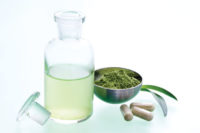Black Tea May Lower Cholesterol
October 2/Washington/Right Vision News -- Black tea consumption may lower bad cholesterol levels and could one day be used to help reduce the chance of heart disease for those at risk, U.S. researchers said.
Scientists with the U.S. Department of Agriculture said they found consumers who drank black tea for three weeks experienced a decrease of between 7-11% in their low-density lipoprotein (LDL) -- so-called bad cholesterol.
Exactly what caused the LDL cholesterol level to drop in those who consumed tea was unknown, but tests are being conducted to determine if the beverage slows the body's ability to absorb LDL cholesterol, the scientists said.
There was no effect on the level of high-density lipoprotein -- the good type of cholesterol -- according to the study of a small group of individuals.
"This may indicate that drinking tea regularly could have a beneficial effect if consumed regularly as part of a mixed diet for most people," said Joseph Judd, a chemist with the USDA, who led the study.
"We aren't talking about drinking tea over a lifetime, which we really can't study, but we have a short study and indications are very positive," he said.
The study was published in the October issue of the Journal of Nutrition.
Cholesterol is distributed in the body attached to proteins called lipoproteins. Studies suggest that high levels of HDL cholesterol reduce the risk of a heart attack, while high levels of LDL cholesterol increase the risk.
Possible health benefits are among several factors that have helped boost tea consumption in the last decade. Consumers also have been flooded with newer shapes, sizes and flavors that have made their way beyond traditional supermarkets and into drug and convenience stores.
Judd and his colleagues placed 15 participants on a six-week, double-blind study. About half received five cups of black tea per day for three weeks, while the others were given colored water that tasted like tea. The two groups then switched what they were given to drink after three weeks.
LDL levels dropped by an average of 7.5% during the three weeks when the individuals consumed tea rather than the placebo blend, the researchers said.
Separately, scientists also tested another group to rule out the effect of caffeine. In that group, 12 of the original 15 individuals were given water-flavored-like tea with caffeine levels similar to what is found in tea. Those who had regular tea saw their LDL levels drop about 11% compared with the caffeine placebo.
The study controlled the diets of the participants by supplying them with their daily meals.
"We had the same background diet for every subject throughout the whole study because these active ingredients (that lower cholesterol) occur in a lot of other foods" such as apples or onions, said Judd.
Scientists at the USDA's research division also are studying the bioactivity of tea compounds for use in treating a wide-range of diseases. Research is currently being conducted on the effect tea has on blood glucose levels, the body's metabolism and cancer.
From the October 18, 2010, Prepared Foods E-dition
Looking for a reprint of this article?
From high-res PDFs to custom plaques, order your copy today!



